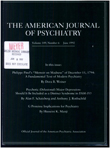Aftermath of the Rogers decision: assessing the costs
Abstract
The Massachusetts Supreme Judicial Court's decision in Rogers v. Commissioner is generally regarded as an important right to refuse treatment decision requiring maximum judicial involvement in the treatment of nonconsenting patients. Since courts and legislators in other jurisdictions have looked to Rogers for guidance on right to refuse treatment issues, and since some have adopted it as a model, it is essential for lawmakers to understand the economic realities of the Massachusetts experience and the commitment of resources required by this model. The authors review these realities, suggesting that there are distinct reasons for considering this particular model "cost ineffective" in preserving patients' rights.
Access content
To read the fulltext, please use one of the options below to sign in or purchase access.- Personal login
- Institutional Login
- Sign in via OpenAthens
- Register for access
-
Please login/register if you wish to pair your device and check access availability.
Not a subscriber?
PsychiatryOnline subscription options offer access to the DSM-5 library, books, journals, CME, and patient resources. This all-in-one virtual library provides psychiatrists and mental health professionals with key resources for diagnosis, treatment, research, and professional development.
Need more help? PsychiatryOnline Customer Service may be reached by emailing [email protected] or by calling 800-368-5777 (in the U.S.) or 703-907-7322 (outside the U.S.).



